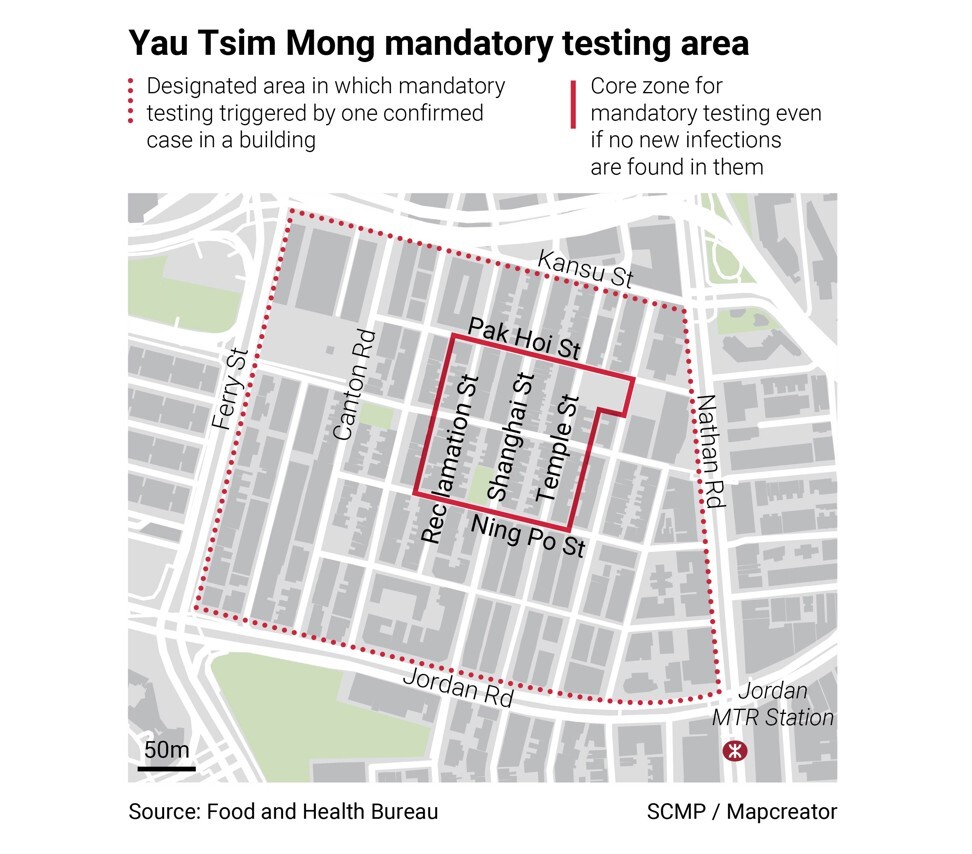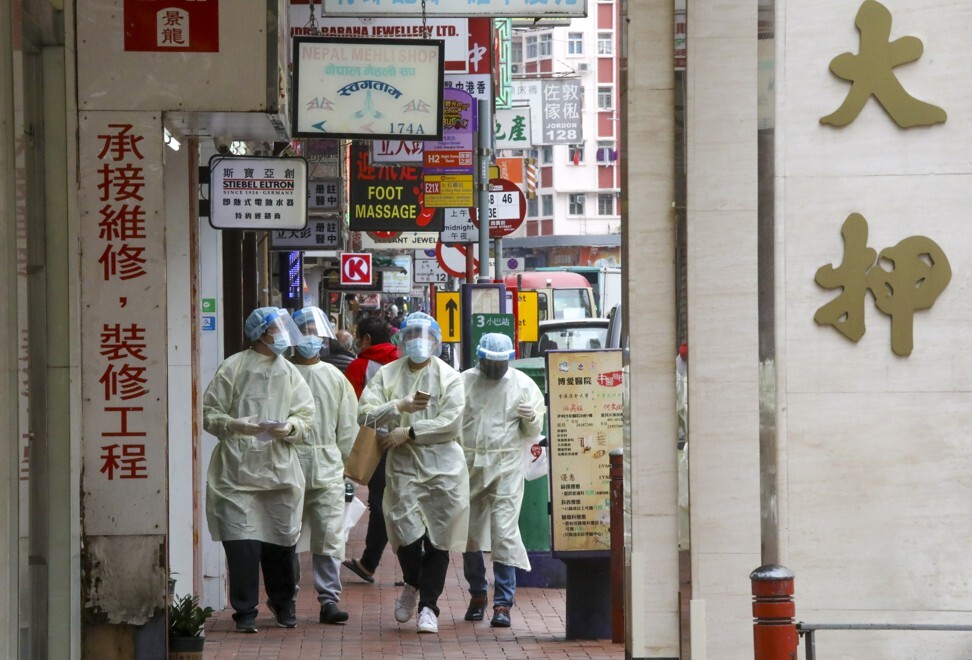
Hong Kong lockdown: more than 1,700 disciplinary officers to be deployed in unprecedented move on 150 blocks in coronavirus-hit area
- Most drastic measure yet in more than a year of pandemic control is expected to start early on Saturday morning
- Many are questioning efficacy of the lockdown after news was leaked by the media, effectively giving residents a heads-up an entire day in advance
The most drastic measure yet in more than a year of pandemic control was expected to start early on Saturday morning, according to sources who had initially expected the lockdown to begin at midnight on Friday.
Many were already questioning the efficacy of the lockdown after the news was leaked by the media, effectively giving residents a heads-up an entire day in advance.
Hong Kong on Friday confirmed 61 new Covid-19 cases, 55 of which were locally transmitted. Twenty-four local cases came from Yau Tsim Mong, and eight of them were found in a designated mandatory testing zone, which the lockdown area will overlap.
Twenty-six cases were untraceable. More than 50 people also tested preliminary-positive.
Only residents who showed negative Covid-19 test results would be allowed to leave their buildings in the lockdown area, sources familiar with the situation said. None would be allowed out of the area until the restriction was lifted.
Even those who tested negative would be asked to remain at home as much as possible, they added.
Sources earlier clarified that Sham Shui Po district, originally believed to be included in the plan, was not affected.

Government sources said more than 1,700 officers from the disciplined services would be deployed, with 500 from police and the rest from customs, immigration, fire services and correctional services.
One of the sources said around 150 housing blocks would be involved, affecting between 4,000 and 9,000 residents. But the exact number of residents had to be confirmed because of unregulated subdivided flats in the area.
“The purpose is to identify those hiding who have not received Covid-19 tests,” he said, adding that residents who had previously been tested would have to be screened again.
He said police would cordon off the area while members of other disciplined services would move in to begin door-to-door inspections with health officers.
Booths for Covid-19 testing would be strategically placed so residents would not have to move far, the source added.
Another source said the operation was expected to start at daybreak on Saturday and likely to end on Monday.
Only three groups of people will be allowed to enter the area: residents, relatives staying in the same flat as those in need of care, and staff members in urgently needed sectors such as care homes.
Shops in the area will remain closed, with government employees providing food and daily necessities to residents. The government is expected to appeal to businesses to show understanding for employees affected by the operation.
Exemptions will be made only for residents with medical needs or who face undue hardship.
“Persistently high and spreading infection [in the areas] and sewage surveillance suggest the outbreak is not yet under control, and many silent sources still exist within the area,” a source said.
The other source said it was possible that some without legal identity documents had avoided testing for fear of being discovered.
A command centre will be set up at the scene, and NGOs serving ethnic minority communities will assist in informing affected residents before the lockdown.
Jordan North district councillor Frank Ho Fu-wing said residents and community leaders were severely unprepared for a lockdown.

“It’s very chaotic and unclear right now, as there’s no official confirmation from the government yet,” he said. “We don’t know how the lockdown will be implemented at all or what to tell residents.”
Ho said he feared residents would flee before the lockdown, posing a bigger risk of transmission to the public.
“Some people who want to leave have probably already left or are planning to leave the area by tonight after news of the lockdown was all over the media,” he said, adding that there was no estimate on the numbers fleeing.
Another district councillor, Owen Li, said a street stall owner told him the Food and Environmental Hygiene Department requested they close by 8pm without an explanation.
By Friday evening, only a few people were out in the streets, buying goods to last the weekend. Resident Johnathan Jones, 35, said he planned to spend the weekend holed up with his wife and four-month-old daughter.
“The lockdown is very necessary, it is good for us because there have been too many cases recently,” said Jones, adding that although his family had already passed Covid-19 tests this week, they planned to take another on Saturday morning.
Others were treating the weekend like just any other.
“Tomorrow will be like just another day,” said 47-year-old Johnson Chin, who lives on Temple Street, at the heart of the “core zone” where testing is mandatory.
The 47-year-old said he had already got used to the quiet streets, and only leaving his flat to smoke, ever since the outbreak started surging in the area.
But Chin said the lockdown was unnecessary if the government had taken action earlier, a sentiment echoed by others. “If they started taking this situation more seriously a half year ago, those who live in this area might be living a normal life right now,” he said.

09:50
SCMP Explains: What's the difference between the major Covid-19 vaccines?
The lockdown decision came after sewage testing devices recently installed across Yau Tsim Mong district showed concentrated traces of the coronavirus.
At the authorities’ daily Covid-19 briefing, Dr Chuang Shuk-kwan of the Centre for Health Protection’s communicable disease branch, declined to comment on reports of the lockdown, saying she was not in a position to do so.
She said mandatory screening orders were issued for two buildings on Battery Street, in the Yau Tsim Mong designated area – where a single infection triggers testing.
Also in the zone, Kensington Plaza on Parkes Street recorded infections in three more flats on Friday.
Out of a total of five affected flats, four face the same direction. All residents who live in a Flat C will be evacuated for experts to investigate whether there is vertical transmission in the building through leaked discharge pipes.
In a second designated area in Sham Shui Po, residents of two buildings on Tai Nam Street and Kweilin Street would also need to undergo compulsory testing.
Outside the mandatory testing zones, screening orders will be issued at four buildings in Tseung Kwan O, Yuen Long and Chai Wan, after infections were recorded in at least two flats in each.
But respiratory disease specialist Dr Leung Chi-chiu told a radio programme that issuing the stay-at-home order would be “too late” and “rather meaningless”, as most residents in the mandatory testing area had already been screened over the past week.
Professor Yuen Kwok-yung, a leading government pandemic adviser, said a lockdown would be useful.
Without confirming one was imminent, he said: “A lockdown will allow officers to register residents’ contact and identity information and ensure everyone subject to mandatory testing will be tested – not just once, but more than once.”
He said residents would need to take a second test five to 10 days after the first one because of the virus’ incubation period.
“As to when [is a good time for a lockdown], it is difficult to say because it affects many people’s living and daily life.”
Luk Hing-fat, chairman of the Temple Street Business Chamber, said he supported the idea of locking down virus hotspots. “It’s better to bear the pain now than to let it get worse,” he told the radio show, adding it would be better to force the community to stay put until all asymptomatic cases were identified.
The Hong Kong Association for Democracy and People’s Livelihood, an opposition party focused on lower-income groups, blasted the lockdown plan and urged authorities to support residents by inspecting plumbing systems in buildings and updating them if necessary.
“The government seems headstrong in committing to ineffective measures. Its latest proposal to lock down a whole zone will cause the stigmatisation of the area and its residents, disrupt residents’ daily lives and severely undermine local economic activity,” it said.
The city’s overall tally of virus cases stood at 9,928, with 168 related deaths. The latest fatality was a 66-year-old woman with chronic illness who died on Friday afternoon.
Additional reporting by Kathleen Magramo, Rachel Yeo, Ethan Paul and Christy Leung



